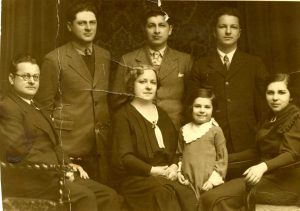Steven (Standing 3rd from the left) and the Kende Family, May 1936
Steven Kende was born in Humenne, Slovakia on August 7, 1919. When the Nazi occupation began on March 15, 1939, Steven was living in Prague with his brother, Vojtech, and attending his first year of medical school at Karlovy University. He was not allowed to take his exams. He began working odd jobs to help his family.
In October 1941, he was deported to Lipa Concentration Camp. It was referred to as a “reeducation camp” and Steven worked as a laborer tending dairy cows. In the fall of 1943, he was sent on a cattle car to Terezin where he tended the oxen. When Terezin was liquidated in 1944, Steven was transported to Auschwitz. While there, a request was put out for metalworkers and he was sent to Meuselwitz, a sub-camp of Buchenwald. The factory where he’d been working was bombed, and Steven was sent by train toward Klingenthal.
Eventually, the prisoners were marched towards the east as the Soviets approached. Steven escaped from the march and attempted to find refuge in Kraslice. The major ordered a police officer to escort him back to the marchers, but he convinced the police officer to let him go free. He offered what help he could to others on his journey to Karlovy Vary and they provided him with food, clothing, and shelter.
After the war, Steven found his sisters in Mexico City where he met his wife.
Additional Links
Watch Steven’s Survivor Interview
Holocaust Survivors Oral History Project
Each spring, St. Michael’s Episcopal School seventh graders engage in an inquiry-based humanities project. Student groups create podcast episodes exploring a theme from Holocaust literature within the historical context of World War Two. In 2020, the nature of that project shifted to accommodate virtual learning during the COVID-19 pandemic. Rather than working in groups to explore thematic connections between literature and history, students created original texts of their own that memorialize the experiences of Virginia Holocaust survivors.
Using the Virginia Holocaust Museum’s extensive collection of survivor testimonies, each student chose a survivor, watched and listened to their story, and took copious notes on what they heard. Then, students synthesized the survivor’s experience, putting it in their own words, adding in historical context when necessary, and recorded themselves retelling their survivor’s story as a podcast episode for the podcast, Use Your Words. Without ever stepping foot in the classroom, seventh graders created oral histories that honor the stories of Virginia Holocaust survivors and are now accessible to anyone around the world through iTunes or Spotify. And, just as importantly, St. Michael’s seventh graders said that the project made them feel bonded to their survivor and gave them a deeper, emotional and historical understanding of the Holocaust.
The best summation of this episode comes from our student, Roman, who tells Steven’s story in this episode:
Steven Kende’s life is best described by this quote from Golden Son by Pierce Brown, “All that we have is that shout into the wind – how we live. How we go. And how we stand before we fall.¨ During the Holocaust all Steven Kende had was that shout into the wind — how he lived and stood before enormous adversity. Steven Kende survived four concentration camps, lost nine family members and gained only nightmares of the past during the Holocaust. When asked what he thinks the most important thing we should learn from the Holocaust Steven Kende simply said: “That we never do it again.”

